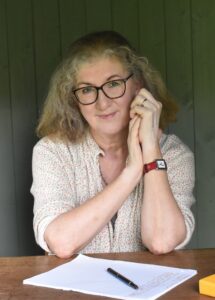Conference Speakers: Debbie Young, Self-publishing For Romantic Novelists, Sat 3-4pm
4 August 2023

Credit: Laura Young
Whether you are traditionally published, self-published, or still wondering which route to take to reach readers, my talk about self-publishing at the RNA Conference will be relevant to you as a romantic novelist.
One of the many great things about self-publishing is that it’s no longer binary:
- When you self-publish your first book, you don’t scupper your chances of winning a traditional publishing contract later in your career, if that’s the path you choose.
- Equally, if you have only ever had your books published by a traditional publishing company, you may still take advantage of the benefits that self-publishing can bring.
- You can be both indie and trade-published simultaneously.
How can this be?
Firstly, it’s a myth that traditional publishers are dismissive of indie authors and their self-published books. What traditional publishers are looking for is authors that will please their target readers. The more enlightened publishing companies – in particular, the new innovative breed of digital-first publishers – are building their lists by licensing rights from indie authors with a proven track record of writing and selling top quality books. Sometimes publishers buy rights to indie authors’ whole back catalogues. Other times they invite indie authors to create new work in the same vein. Or they might do both.
My own experience provides a handy example:
When Boldwood Books, which is just four years old, offered me a contract for my backlist of nine novels, plus two new ones in each of my two series, I was very pleased to accept. As I neared completion of that contract, I pitched an entirely new series, which I’ll start writing for them this autumn. Meanwhile I continue to self-publish other books that don’t match their list. I haven’t sold my indie soul!
So how about the other way round?
There are many situations in which traditionally-published authors can benefit from self-publishing. Supposing your contract comes to an end, or your publisher changes direction and no longer wants to market your books, or they cease trading altogether? Self-publishing to the rescue! As soon as you get your rights back, you can self-publish your books – and no-one can delist them, other than you. You have the rest of your life (plus 70 years, under UK copyright law) to capitalise on your intellectual property.
This is assuming that you licensed your rights for a limited period. Five to seven years is standard. This is why when signing a traditional publishing contract, you should never give away your copyright outright.
Self-publishing isn’t easy. It requires skill, perseverance and investment – but it’s never been easier to learn how to do it well, thanks to a growing choice of tools and services. The huge, supportive indie community will help you along the way, via groups such as the Alliance of Independent Authors. (Disclosure: I’m one of their UK Ambassadors.)
At the RNA Conference, my talk will expand on these ideas and explain just what self-publishing involves. I look forward to seeing you there and to answering your questions.
Debbie Young


